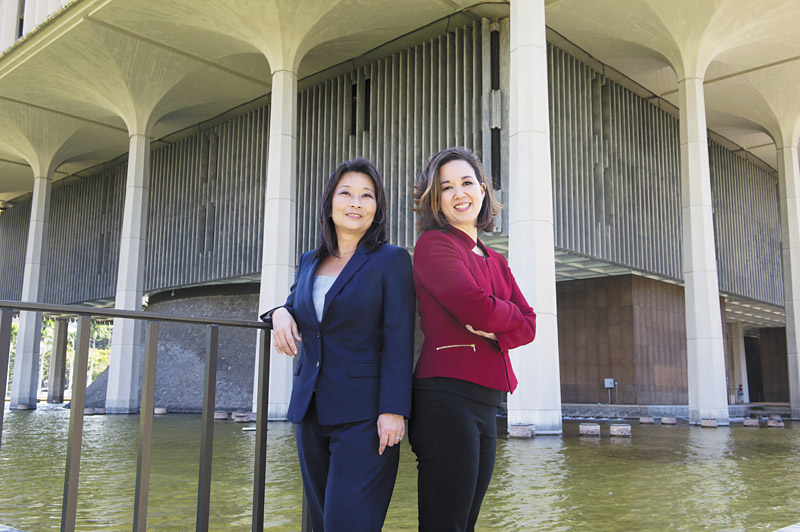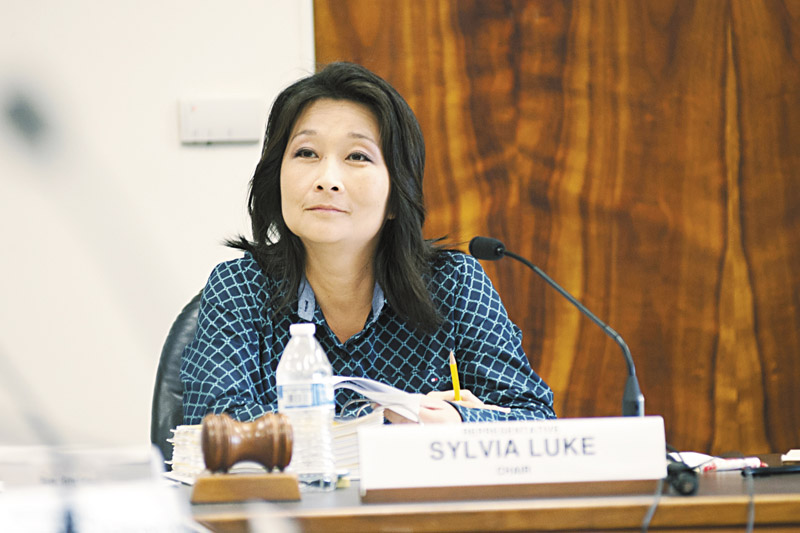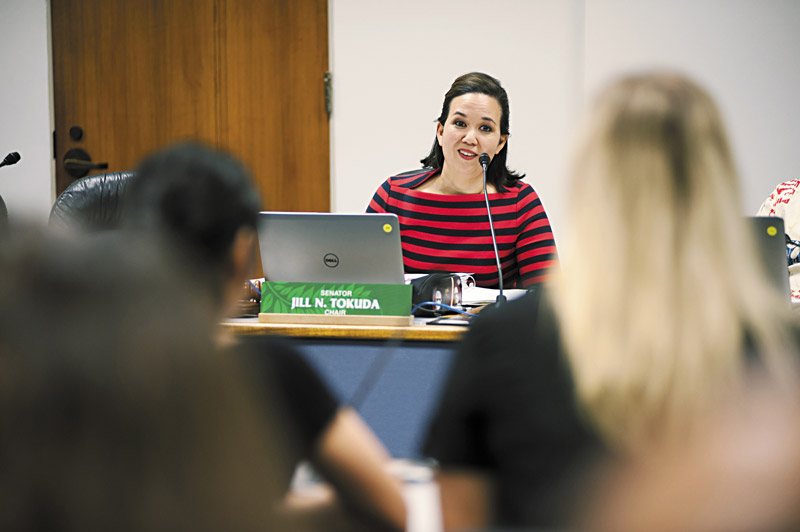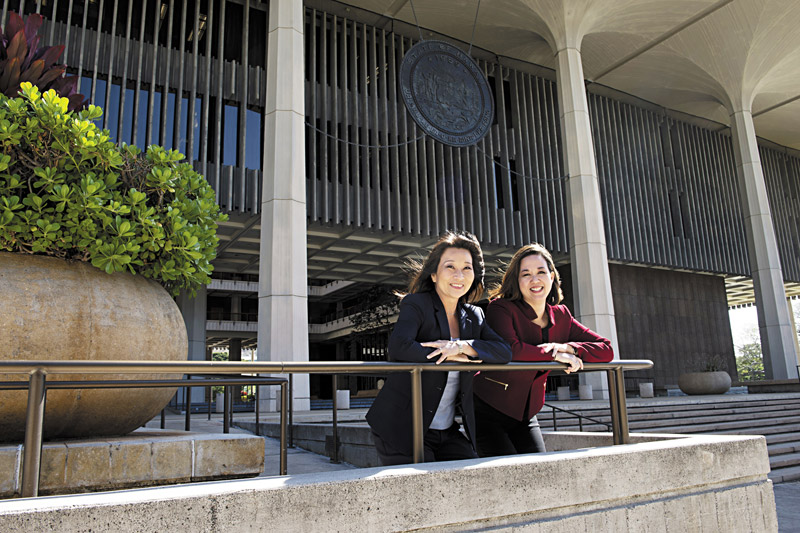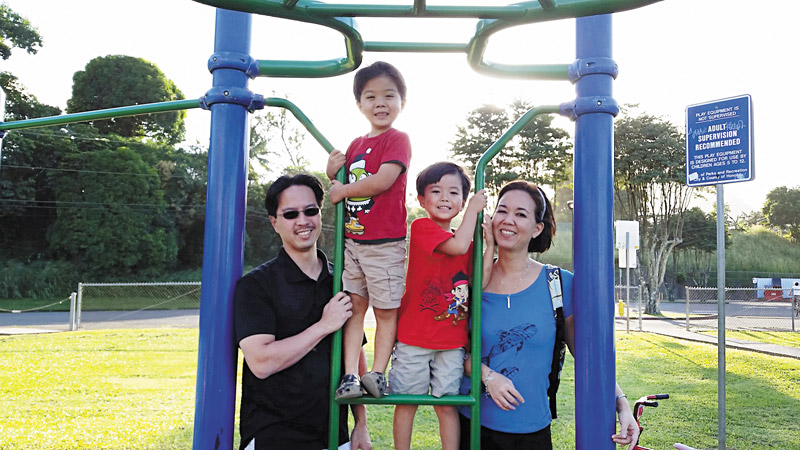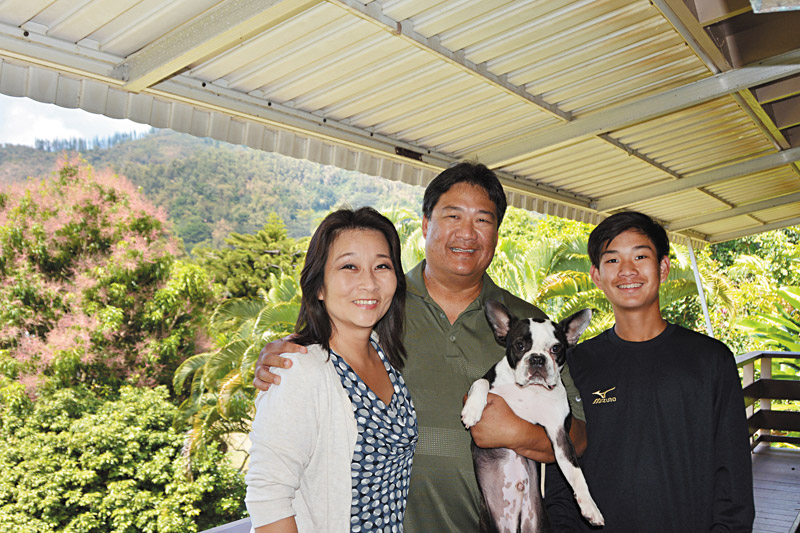Da Sistahs: Looking Out For Your Money
Jill Tokuda chairs the Senate Ways and Means Committee, Sylvia Luke chairs the House Finance Committee. In other words, they control the purse strings at the Legislature. And they’re very picky about what they’re willing to spend money on
Twenty-one women serve in the Hawaii State Legislature: eight in the 25-member Senate, 13 in the 51 member House of Representatives, roughly 28 percent of the whole. The Legislature thus remains, a decade and a half into the 21st century, a men’s club.
To be sure, the representation of women in Hawaii’s legislature stands above the national average of 24 percent, but it’s far below the nation’s leaders: 42 percent of Colorado’s legislators are women, 41 percent of Vermont’s.
Committee chairmanships provide another measure of women’s influence at the Capitol. Fourteen committees consider the hundreds of bills introduced each session. Women, currently constituting one-third of the Senate’s members, chair eight of its committees.
No such female dominance of committee chairs exists on the House side of the Capitol. There, of 19 committees, women chair only three.
That said, in the legislature there are committees — and there are committees. All but two of the Legislature’s total of 33 deal with subjects or process. The remaining two are where a preponderance of power resides: House Finance and Senate Ways and Means. Women chair both.
Seven-term Rep. Sylvia Luke (D) presides over House Finance, third-term Sen. Jill Tokuda over Ways and Means or, more familiarly, WAM.
“Policy has to match revenue,” says Mike McCartney, a former state senator himself and currently Gov.
David Ige’s chief of staff, “and that matching is done in the money committees.”
Because of the critical nature of that match, in neither Senate nor House has the majority chosen time-servers to chair their money committees. Both the jobs and the process are too important.
Indeed, the route through chairmanship of the money committees has led to higher, more prestigious office. Both current House Speaker Joe Souki and his predecessor Calvin Say chaired House Finance before ascending to the Speaker’s rostrum. And two chairs of Senate Ways and Means, Ben Cayetano and David Ige, have become governor.
Thus the power and the potential of Luke and Tokuda. House Finance and WAM decide the fate of every bill referred to them: those by the governor and those by the legislature’s 31 subject committees. Legislation sans funding is meaningless.
Their legislative success and political careers also speak to the gender diversity of Hawaii politics. In Congress, the late Patsy Mink championed Title IX, ground breaking in the struggle for gender equality nation-wide.
Two women, Sen. Mazie Hirono and Congresswoman Tulsi Gabbard, make up half of Hawaii’s congressional delegation. But since statehood, only one woman, Republican Linda Lingle, has held the governorship; seven Democratic men have.
Luke and Tokuda finish each other’s sentences. They look at each other knowingly when a question is asked, they smile in recognition that they know things the interviewer doesn’t, and perhaps shouldn’t know. They laugh easily, lunch together often, and compare notes on those who testify before their committees.
“I call them Da Sistahs,” says a longtime legislative staffer.
Tokuda appears to defer to older sister Luke. The younger sister denies it: “Typically I like to allow other people to go first,” she says. “Hearing what they have to say helps me craft my own answer.”
Neither woman seems ill at ease talking about any issue.
Both are spending the current legislative session listening to former WAM Chair, and now Gov. David Ige’s department heads argue for more funding. Awkward?
“Last session we gave the governor’s people a pass,” Luke admits. “They were new to their departments, and they hadn’t put together the budgets they were required to defend. This session I think there’s been some expectation that we would go easy on them. In fact, we expect more from the governor. We consider him a friend, and we know what he’s capable of.”
Tokuda agrees. “You can be forthright with friends. I think we’re much more direct with Gov. Ige. At the information meetings, we drilled down on the Department of Budget and Finance. I don’t think we were mean, but the legislature has a fiscal responsibility to check and balance the executive.”
A case in point: Luke has long opposed shifting money from one fund to spend on something else. In his State of the S state speech, Ige called for borrowing $100 million from the Green Energy Market Securitization Fund program to air-condition Hawaii’s sweltering public school classrooms.
Luke’s Finance Committee dismissed it immediately. A few weeks later, WAM did the same, in effect telling the governor he had to find another way.
Both money committees also rejected the Hawaii State Teachers Association request for a hike in the general excise tax. Says Tokuda: “One percent for long-term care, an increase in the fuel tax, something extra in the GET for teachers. Singularly, I can at least see justification for them, but together I see them as too much of a burden on the taxpayer.”
Luke agrees in part: “The GET is always tough, because it’s regressive. It hits lower-income earners harder than it does the wealthy.”
Luke bridles at the suggestion that legislators don’t do taxes — or anything else that’s controversial — in an election year: “We did same-sex marriage in an election year. I think the legislature acts when an issue is ripe for discussion and appropriate.”
People differ, she says, sometimes fiercely, over what’s “ripe … and appropriate.”
Ige wants his school air-conditioning money now. Luke lectures him about the budgetary process. Rep. Bob McDermott wants air-conditioning and a new high school for his Ewa Beach district, but Maui wants a new high school too. Luke and Tokuda must negotiate the differences. Everybody wants something from the money chairs.
They must also, on occasion, scold. When Mayor Kirk Caldwell crossed Punchbowl Street to ask for an extension of the half-percent excise tax for rail, he received a public rebuke from Luke and Tokuda.
“Caldwell misled us,” says Luke. “He was disingenuous,” Tokuda adds. “He tried to get away with generalities that sounded good, but didn’t provide the facts necessary to get what he needed. Kirk should have known better. We need good facts in order to do our job.”
In her campaign literature, Tokuda advertises herself as a native daughter of her Kaneohe senate district: born in, educated in, and representative of it. Tokuda is pushing 40 years old, the daughter of Paul and Cheryl Tokuda. She’s a fourth generation, Japanese American of Okinawan heritage.
Tokuda attended public schools — Kaneohe Elementary, King Intermediate and Castle High School. In intermediate, she met Kyle Michibata. They quickly became best friends. “At age 13, I told Kyle we would date other people but that one day I would marry him,” she says. Tokuda kept her word. They married in 2005. They now have two children, two boys aged 6 and 7.
Tokuda caught the political bug early. In high school she campaigned for friends who were running for class offices, and she caught the eye of then-State Sen. Mike McCartney. “I had the Education Committee in the Senate, David Ige had it in the House,” McCartney remembers.
“David and I would attend meetings of the statewide student council. They were bright young people. I first met Jill at a student council retreat at Camp Mokuleia. She volunteered in my senate office.
“In 1993, David and I sponsored an omnibus education bill that established charter schools and called for a student member of the Board of Education. Jill worked out of my office lobbying for the latter. She sat at the table with us to hear testimony. The Board opposed it.”
For college, the budding political activist headed for the capital of American politics — D.C. — and attended George Washington University, where she majored in international relations and minored in Japanese studies. Her political education ran a close second to her course work. She interned at the Democratic National Committee, joined GW’s college Dems club, and campaigned for friends running for college offices. Says Tokuda, “Politics had become a part of what I was.”
The private GW was raising tuition, however, so Tokuda took additional credits at UH and graduated in three and a half years. Her parents wanted her to go to law school, but she’d seen enough of friends who had and decided it wasn’t for her. “So I filled out the applications, then didn’t send them in,” she laughs.
“I got a job at the Sheraton Waikiki Esprit Bar as a cocktail waitress. I was a bad waitress. I had horrible balance. I dropped drinks. But I could speak a little Japanese, and that was an asset. All in all, waitressing was a humbling experience.”
Tokuda remained active with the Hawaii Young Democrats, but gave up balancing drinks on a tray for a high school program coordinator’s job with the Pacific Asian Affairs Council. She also did a stint in the late Duke Bainum’s city council office. “Honolulu Hale was not a pretty place to be,” Tokuda remembers. “There was too much factionalism and dysfunction.”
Tokuda left for a job with Lt. Gov. Mazie Hirono. There she remained through Hirono’s last term, serving as the LG’s community person. “Mazie became a good friend and a valued supporter,” says Tokuda. “I call her my political mom.”
In 2002, Hirono lost her bid to succeed Ben Cayetano, dropping the gubernatorial race to Republican Linda Lingle. The defeat marked the beginning of a tough period for Tokuda. Her mother, already suffering from heart problems, died in a car crash. She was only 44. She had to help her father and two brothers through it.
“In that period, I learned that there are a lot of things more important in life than losing an election,” she says. “It taught me perspective and balance and the importance of family.”
In 2006, Republican Bob Hogue decided to give up his Windward Senate seat to run for Congress. Tokuda immediately announced for the vacant seat. In the Democratic Party primary, only “blank votes” opposed her. In the general election, she took 56 percent of the vote.
She devoted the bulk of her first two terms in office to the Senate education committee. There she championed early childhood education and charter schools.
Tokuda easily won a third term in 2014. When David Ige moved upstairs to the governorship, Tokuda’s senate colleagues moved her into WAM’s vacant chair.
Sylvia Eun Jung Chang Luke was born 48 years ago and more than half of the world’s largest ocean away, in Korea. She came to Hawaii at the age of 9 along with her mother, brother and sister.
“My dad was in the import-export business,” she explains. “After a few years he decided that it was too difficult traveling back and forth to Korea. So he sent for us.”
On arrival in Hawaii, Luke describes her English as “nonexisting My parents put papers all over the house saying ‘A is for apple’ and the like, drawings with their English words underneath. Our home was papered with English language cards — including the bathroom,” she laughs.
Luke learned. Public schools helped: Lincoln Elementary, Kawananakoa Middle and Roosevelt High School. Luke rejects any notion that her mother was a so-called Tiger Mom. “I was a nerd,” she offers instead.
“It was hard for her,” Luke explains. “She left her family in Korea, comes here to Hawaii and eight years after she arrives her husband dies. She’s left with three small kids, maybe some money, but she had to work. That’s why we went to public school. Somehow, she made ends meet. We never felt needy.”
Daughter Sylvia also worked, “part time at diners when I was in high school and college.”
College was the University of Hawaii at Manoa. There she majored in English and became involved in campus politics. She won election as the Arts and Sciences representative to the Associated Students of the University of Hawaii.
In Manoa student government, she also met a swain, the representative from the engineering school named Michael Luke, whom she would marry in 1998. Their son is now 13 and a student at Iolani.
Luke graduated from college in 1989, spent a semester studying international studies at Yonsei University in Korea, then took a job as a paralegal. In the fall of 1992, Luke entered law school at the University of San Francisco. USF is private, thus expensive, so Luke financed it with scholarships, loans and a return to do her third year as a visiting student at the University of Hawaii’s Richardson College of Law.
She met some interesting fellow law students at Manoa: Blake Oshiro, a future state representative and aide to Gov. Neil Abercrombie; Billy Kenoi, the current Big Island mayor; Doug Chin, Hawaii’s attorney general, and Ernie Martin, chair of the Honolulu City Council.
Upon graduation in 1995, Luke took a job with the law firm of Cronin, Fried, Sekiya, Kekina and Fairbanks. “I found the law to be very interesting work,” says Luke.
But three years later, a house seat was vacated by Republican Quentin Kawananakoa. “It was a hard decision,” says Luke. “I knew it would make practicing law more difficult. Many people told me that you can’t be good at both.” Luke consulted her family — her mother “just laughed” — and her own conscience.
“At age 30, I envisioned I’d be in the legislature for 10 years, and by 40 I’d be practicing my profession full time,” she told an interviewer, “I’m 48 years old and I’m still here. I wouldn’t be if I didn’t think I was effective.”
Apparently, others think she’s effective as well. House Finance Committee colleague Aaron Ling Johanson calls Luke “very fiscally responsible” and “one of the last to want to spend money. She’s also keen about saving money for a rainy day.
“What’s also commendable is that she knows the budget. She’s committed a lot of it to memory. That’s amazing given the size of the state budget.”
Her colleagues at Cronin, Fried value her as well, enough to make compensations for her consuming legislative work. “During session I’m at the law office from 6:30 a.m. to 9 a.m., then I go to the Capitol.”
Maybe Sylvia Luke can be good at both.
Asked if either of them would consider a run to become the second woman to hold Hawaii’s governorship, Tokuda responded: “If I’m doing my job well, and if opportunities open, I’d consider higher office.”
Says Luke, immediately: “And I would be the first to support her.”
Da Sistahs, indeed.

